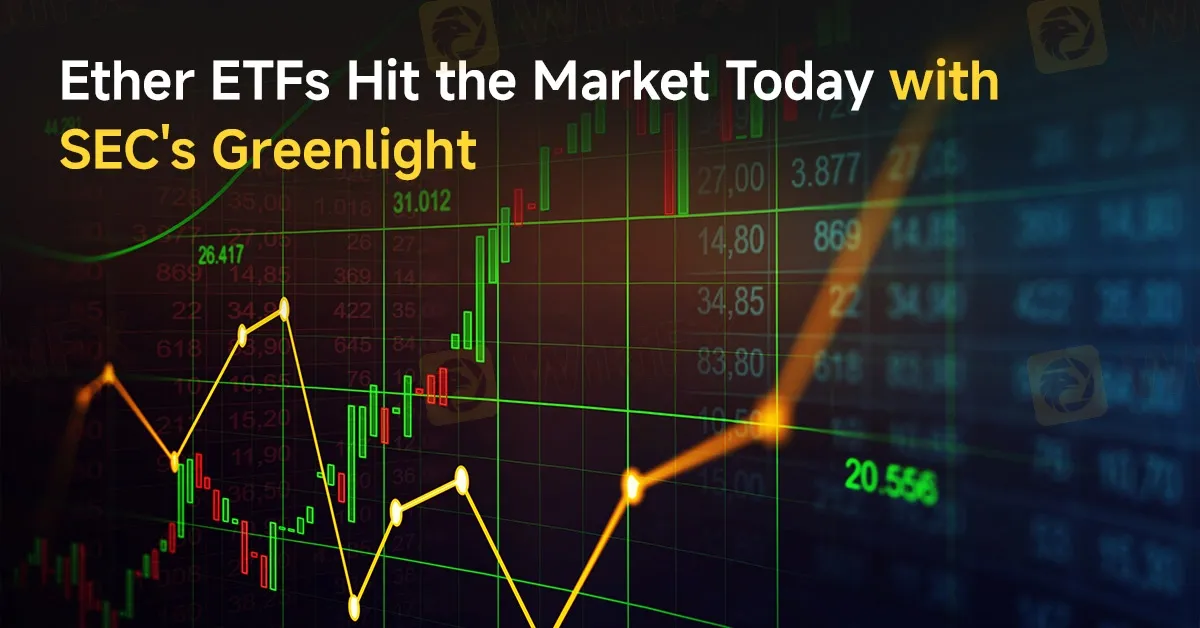简体中文
繁體中文
English
Pусский
日本語
ภาษาไทย
Tiếng Việt
Bahasa Indonesia
Español
हिन्दी
Filippiiniläinen
Français
Deutsch
Português
Türkçe
한국어
العربية
Ether ETFs Hit the Market Today with SEC's Greenlight
Abstract:Spot Ether exchange-traded funds (ETFs) are set to commence trading in the United States on July 23, following final approval.

Spot Ether exchange-traded funds (ETFs) are set to commence trading in the United States on July 23, following final approval.
On July 22, the U.S. Securities and Exchange Commission (SEC) gave the green light to the final S-1 registration statements needed for their launch across multiple stock exchanges, including the Nasdaq, New York Stock Exchange, and Chicago Board Options Exchange. Approved issuers include prominent names such as BlackRock, Fidelity, Grayscale, 21Shares, Bitwise, Franklin Templeton, VanEck, and Invesco Galaxy.
This milestone follows the SEC's earlier approval on May 23 of the 19b-4 applications, permitting the listing and trading of spot Ether ETFs on these exchanges. The iShares Ethereum Trust by BlackRock will be listed on the Nasdaq, while the Grayscale Ethereum Trust will appear on the NYSE.

Analysts predict that these spot Ether ETFs could draw between 10-20% of the inflows seen by spot Bitcoin ETFs since their introduction six months ago. Crypto analyst Mark Dunleavy highlighted the potential impact on Ethers spot price, noting that ETH is “less available on exchanges, meaning thinner order books and less to purchase,” which could make its price more sensitive to buying demand from ETFs compared to Bitcoin.
The spot Ether ETFs come with a variety of fee structures. Invesco and Galaxy have set their management fees at 0.25%, slightly above VanEck's 0.20% and Franklin Templeton's 0.19%. These rates are significantly lower than the 2.50% management fee charged by Grayscale‘s existing Ethereum Trust. Notably, most spot Ether ETFs, including those from Fidelity, 21Shares, Bitwise, Franklin, and VanEck, will waive fees until a certain time period elapses or their products reach a specific net asset threshold. Grayscale’s new Ethereum Mini Trust will also waive fees for the first six months or until it accumulates $2 billion in net assets.
Crypto-native hedge funds, which have traditionally self-custodied significant amounts of spot ETH, are now turning to institutional market makers like Virtu Financial to exchange those holdings for ETF shares. Over a dozen crypto-native funds, each managing assets exceeding $1 billion, have expressed interest in these exchanges.
The launch of spot Ether ETFs adds to the expanding roster of publicly traded crypto funds, which already includes nearly a dozen spot Bitcoin ETFs that began trading after receiving regulatory approval in January. Currently, ETFs hold more than $50 billion worth of Bitcoin.
Industry analysts foresee that the listing of ETH ETFs could lead to substantial inflows, potentially driving up the spot price of Ether as these new investment vehicles gain traction in the market.

Disclaimer:
The views in this article only represent the author's personal views, and do not constitute investment advice on this platform. This platform does not guarantee the accuracy, completeness and timeliness of the information in the article, and will not be liable for any loss caused by the use of or reliance on the information in the article.
Read more

Medical Officer Trapped in a Crypto Nightmare
A medical officer in Malaysia suffered a significant financial loss after falling prey to a cryptocurrency investment scam that originated on social media. The victim, a 39-year-old woman, was deceived into transferring her savings of RM86,200 following a series of fraudulent claims promising lucrative returns.

Thailand’s War on Illegal Crypto: Five Firms Raided, Millions at Stake
In a significant move against illegal crypto-related activities, Thai authorities have cracked down on five unauthorized cryptocurrency firms operating within the country. The Economic Crime Suppression Division (ECD) conducted coordinated raids across Bangkok, Nakhon Pathom, and Samut Sakhon, leading to the arrest of 11 individuals involved in unlicensed electronic currency transactions. The operation underscores Thailand’s strict regulatory stance on financial crimes related to digital assets.

Why Hasn’t Binance Listed Pi Network (PI) Yet? Key Reasons Explained
Why hasn’t Binance listed Pi Network (PI)? Discover the key reasons, including mainnet restrictions, regulatory concerns, and what needs to happen for a future listing.

Famous Olympic Breakdancer’s Brother Faces Crypto Fraud Charges
Australian Olympic breakdancer Rachel "Raygun" Gunn’s brother, Brendan Gunn, accused of crypto fraud involving $181,000. ASIC investigates.
WikiFX Broker
Latest News
Is TUOTENDA a cryptocurrency scam primarily targeting men over the age of 50?
Canada to Enforce Retaliatory Tariffs if U.S. Duties Persist
Unbelievable! Is the Yen Really Gaining Strength?
FINMA Opens Bankruptcy Proceedings
$13M Pig Butchering Scam: Three Arrested for Money Laundering
FCA Issues Warning Against 14 Unregistered Financial Firms
Crypto Scam Exposed: 3 Arrested for Defrauding Investors
Nifty 50 Index Futures Now Available at Interactive Brokers
Grand Unveiling: The Core Reasons Behind the Yen’s Rise
Ethereum’s Shock Drop: What’s The Real Reason?
Currency Calculator






